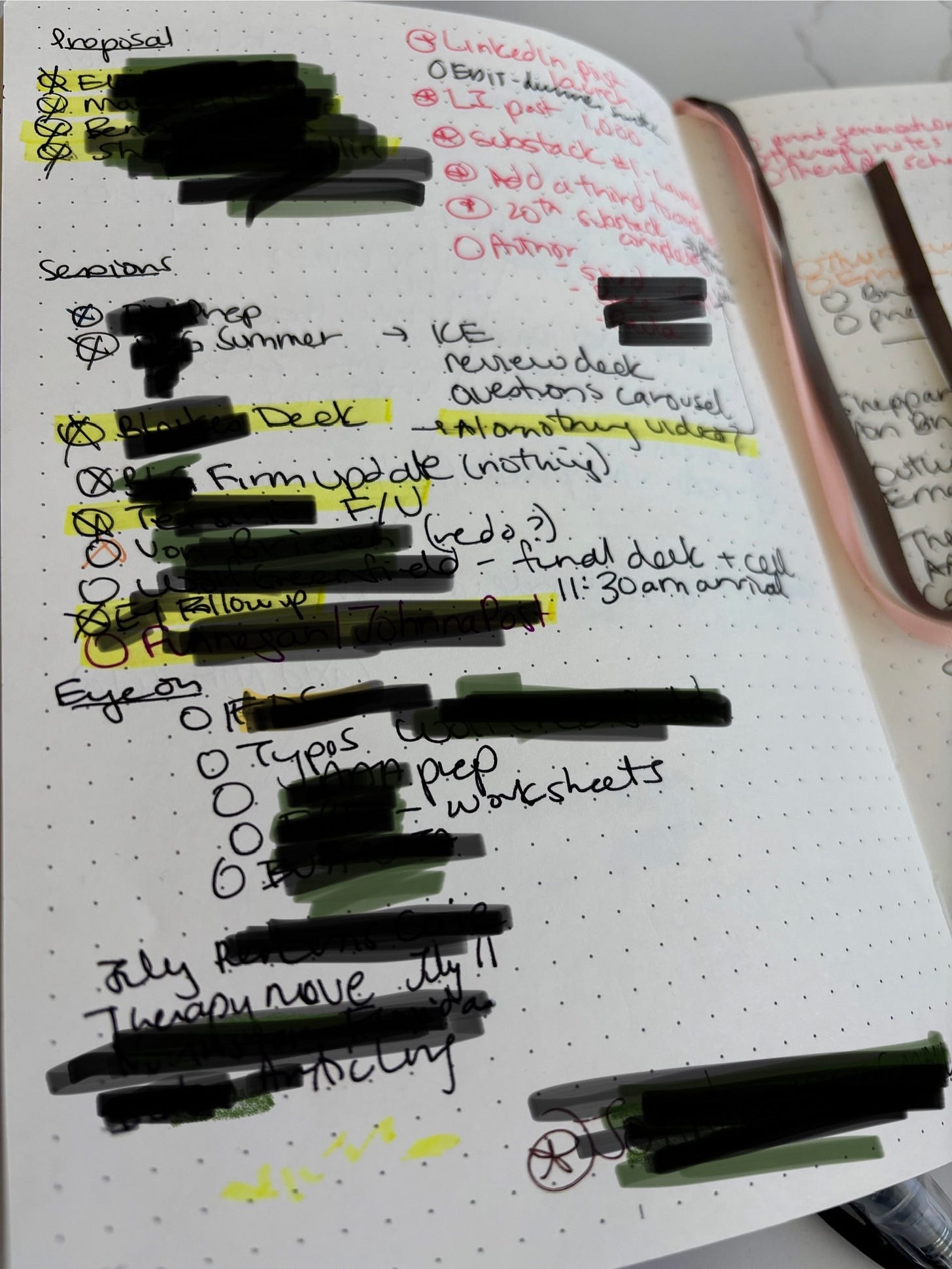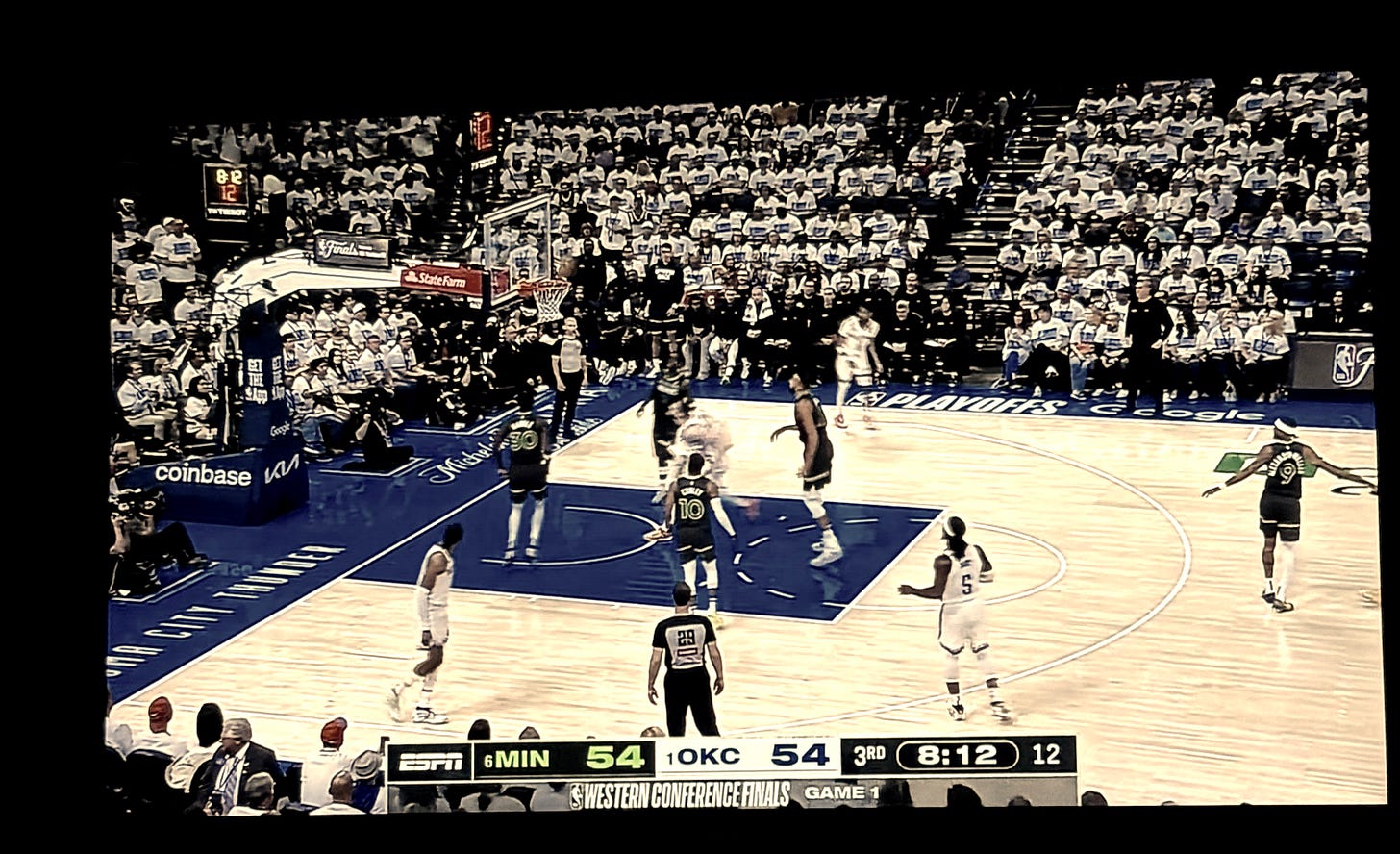Your To-Do List Reflects Your Take on Responsibility
... and that's a gift (and sometimes a huge bummer).
Right now I am sitting at YYZ (the Toronto Airport) preparing for an in and out flight to Boston. I’ve just written out my to-dos, things I imagine are totally reasonable and important for me to attend to over the next 24 hours.
Looking at the list, one thing is devastatingly clear: I will not be able to get it all done.
The wasteland that is my to-do list, from last week to this, anonymized. Not featured: 1 additional page, similar in density and volume of to-dos, in various stages of completion, inattention, avoidance, and action.
My to-do list, ever-growing, is never complete. I make up that yours is too. Our to-dos grow directly from our complexity, as human beings.* It goes deep.
The length and content of our to-do lists, and how we relate to them, also stems from how we learned to carry, perceive and distribute responsibility.
We learn what’s ours to carry, from the salient and explicit distribution of labour and roles: in our communities, society writ large, and our family systems growing up.
How responsibilities are distributed is impacted by the programming and conditioning about who we expect to do what in our society.** The various intersectional, beautiful and multidimensional identities you occupy have implications (from a societal programming and conditioning place) on the role you are assumed and asked to play in this world. It’s a construction, of course, often times imbued with racist, heteronormative, misogynistic and neurotypical assumptions.
Despite the inequity, the consequences are real. How many times are women asked to take notes in meetings? A person of color shopping at a grocery store, asked by another shopper where to find something?
Who is seen as a helper and who is seen as a leader? Whose to-do list automatically gets helping tasks, explicitly and implicitly?
What we carry as ours, our lists, are also deeply impacted by how we grew up.
Little Kara (very much a helper, then and now)!******
What was your role in your family growing up? As a child, how capable did you need to be in order to survive? How much could you rely on adults for help? What was expected of you in your family unit: to be able, or to be fragile? These patterns of assuming or resisting responsibility, called over functioning and under functioning***, have ripple effects well into adulthood. Well onto your to-do list.
So it is that we find ourselves where we are.
With lists that stretch past the length of our bodies, reflections of what kept us safe and connected growing up, and also of what is holding us back… now. Patterns and roles that we learned long ago, that no longer serve us.
Our to-dos reflect the different relationships and roles we play in our lives, our commitments, ambitions, preferences, basic human needs (sleep, eat, laugh, cry, get hugs), as well as what we learned, from society and our families, was ours to carry through this life.
I am now in Boston, having successfully made it from the airport to my hotel. Looking with gentleness at my pages-long to-do list. Holding all the pieces of me. Putting the origins of our to-dos between us, asking these questions, I see more clearly now what’s present (actually needing to be done), vs. what’s past (what I learned I should do, but don’t actually need to do).
I, like you, am many things at the same time.
Last night I was full-on a basketball fan, watching the Western Conference Finals alone in a hotel room late into the night instead of sleeping. It was a choice.
Here is the thing no one tells Strivers:
It’s not a matter of trying harder or being more organized. You are more things than you have time to explore, and that’s brilliant and wonderful, as much as it is a huge bummer.
The consequence of our limited humanity is gross and liberating at the same time: we have to choose. We have to pick which parts of ourselves get satisfied, in what measure, at what intensity, and when. We cannot do it all. Not everything. So what gets done is what we prioritize. The work is in the ruthless choices****.
Knowing where our to-dos come from helps us make those choices. We can ask: Is this thing on my list actually mine? Or did it get here because I absorbed it from a society that values me differently than I value myself? Did I learn to take it on as a child? What truly matters on this to-do list, to me?
To separate the past from the present: Pay attention to the shoulds. Notice where you feel alive vs. where you feel drained. Look at where guilt shows up. Be curious about it: what exactly, are you feeling is wrong? Inspect and investigate anytime a sense of “being good” takes over, or lands an item on your list.
In the other direction, allow yourself to dream: What will I do today, with my one wild and precious life?***** It’s not an overnight change, and for a long time it can feel like you don’t have answers. You might feel like you are lacking direction, no longer making progress. Can you trust yourself enough to see how your clarity comes with patience. Can you practice reverence for yourself? These learnings we carry inside take time to unwind and unfurl. The process is the reward, the becoming that happens to and through you. Don’t rush it. Be there for it, as your to-dos transform.
As always, be gentle out there - on yourself and on one another.
*Burkeman, O. (2021). Four thousand weeks: Time management for mortals. Farrar, Straus and Giroux.
**There’s lots on systems and societal programming and how it impacts productivity culture out there. I really like the treament done by Tricia Hersey in her manifesto, and the Nagoski sisters in their work on burnout:
Hersey, T. (2022). Rest is resistance: A manifesto. Little, Brown Spark.
Nagoski, E., & Nagoski, A. (2019). Burnout: The secret to unlocking the stress cycle. Ballantine Books.
***Lerner, H. (2001). The dance of connection: How to talk to someone when you're mad, hurt, scared, frustrated, insulted, betrayed, or desperate. HarperCollins. There’s an excellent podcast on this: Brown, B. (2020, September 7). Brené on anxiety, calm + over/under-functioning [Audio podcast episode]. In Unlocking Us. Spotify. https://brenebrown.com/podcast/brene-on-anxiety-calm-over-under-functioning/
****Burkeman, O. (2021). Four thousand weeks: Time management for mortals. Farrar, Straus and Giroux. (AGAIN, I know, it’s a great book. I am excited to see him in person for the latest book in Toronto soon!)
***** The Summer Day is one of my favourite poems. You can find it here: Oliver, M. (1992). New and selected poems (Vol. 1, p. 94). Beacon Press.
****** I love how in this photo you can see my Mom’s hands in the reflection, trying to get just the right angle for me. It was unrelated to the post, but feels so loving I wanted to be sure to include it at the very bottom here :)








I read this in your voice and I heard it so lovingly. Thanks for a great post, friend. Great reflection questions.
Love the curiosity in looking behind the to dos and all that is baked into that. I recently completed a 'leadership assessment' and in the "accountability" bucket for the concept of "takes ownership" - I rated low as compared to the pool of 'leaders' who had previously taken the assessment. As I had approached the questions I had thought about the importance of being judicious as a leader about what one needs to take ownership of and where others should take the wheel in order to (1) not burn out and (2) allow others to grow and shine. Of course I am accountable for the overall results - but do I "own" it all? How does that translate to what we put on OUR to do list and where we draw lines. So fascinating to think about it from the lens you have encouraged here, and consider all that is baked into the "command and control" concept of leadership. Does that serve us? our to-do lists? our spirit???